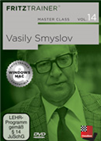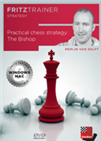Vitiugov’s first national title
In his fifteenth attempt, Nikita Vitiugov won the Russian Championship for the first time in his career. The 34-year-old from Saint Petersburg finished the tournament with an undefeated 7/11 score after beating three 2700+ rated colleagues — Vladimir Fedoseev, Dmitry Andreikin and Kirill Alekseenko.
 Smyslov cultivated a clear positional style and even in sharp tactical positions often relied more on his intuition than on concrete calculation of variations. Let our authors introduce you into the world of Vasily Smyslov.
Smyslov cultivated a clear positional style and even in sharp tactical positions often relied more on his intuition than on concrete calculation of variations. Let our authors introduce you into the world of Vasily Smyslov.Vitiugov drew Aleksandr Rakhmanov with black in the final round, while second-placed Maxime Matlakov was still playing against Andrey Esipenko. The eventual champion has learned not to celebrate before everything has been resolved on all relevant boards. Vitiugov told the Chess Federation of Russia:
When the game was about to finish, I was confident that this was going to be a tiebreak. It was a difficult moment: on the one hand, the tournament is over, and on the other hand, the fight for the first place is not yet out of the question. I already have experience finding myself in a similar situation and going down against Peter Svidler in a tiebreak. I went for a walk because I simply wanted to be as fresh for the game as possible. I relaxed only when the situation clarified after the last move in the Esipenko vs Matlakov game.
His reluctance to celebrate before everything was decided is not without reason, as the new Russian champion has experienced heartbreak in critical situations in the past. Most notably, at the 2019 World Cup, when he was knocked out by Yu Yangyi in the quarterfinals after getting a completely winning position in the Armageddon decider. Moreover, the Russian had been playing great chess throughout the event, having knocked out Sergey Karjakin and Wesley So in previous rounds.
This was his year, though, as Matlakov was actually on the back foot against Esipenko — the game was a 65-move draw, and resulted in Esipenko’s eleventh split point of the tournament. Vitiugov’s performance gained him 6.8 rating points, which leaves him as the fourth highest-rated Russian player in the world, behind Ian Nepomniachtchi, Alexander Grischuk and Sergey Karjakin.

Nikita Vitiugov | Photo: Eteri Kublashvili
Matlakov was not the only player who could catch up with the leader, though, as Fedoseev also entered the last round a half point behind Vitiugov. Fedoseev, however, was in a losing position against Pavel Ponkratov while Matlakov and Esipenko cotinued fighting — in a rollercoaster game, Fedoseev had failed to make the most of his kingside attack soon after the time control.
 Garry Kasparov's rise to the top was meteoric and at his very first attempt he managed to become World Champion, the youngest of all time. In over six hours of video, he gives a first hand account of crucial events from recent chess history, you can improve your chess understanding and enjoy explanations and comments from a unique and outstanding personality on and off the chess board.
Garry Kasparov's rise to the top was meteoric and at his very first attempt he managed to become World Champion, the youngest of all time. In over six hours of video, he gives a first hand account of crucial events from recent chess history, you can improve your chess understanding and enjoy explanations and comments from a unique and outstanding personality on and off the chess board.
In this double-edged position, Fedoseev played the good-looking 43.Rf5, which was correctly refuted by Ponkratov with 43...Bh6. Soon after, Fedoseev began to lose the thread, and he ended up losing what turned out to be the longest game of the day.
In the diagrammed position, White had 43.Nf5, clearing the way for the queen to attack f7. If Black defends the pawn with 43...Kg6, there is 44.Rf3, and although the winning lines are not trivial, the black king cannot escape the attack.
Fedoseev thus finished with a 6/11 score, a half point behind Matlakov and tied with Andreikin. He had a better tiebreak score than the latter and finished in third place — which means the three top finishers in this year’s championship all hail from Saint Petersburg.

Vladimir Fedoseev facing Pavel Ponkratov | Photo: Eteri Kublashvili
Final standings
All games
Gunina keeps it together to win the women’s title
It was a nervy final-round game for the 2021 Russian women’s champion. After all, a loss against Polina Shuvalova would have taken the title away from the player who led the standings for most of the tournament. Things worked out well for the 32-year-old from Murmansk, though, as she drew the game and won the national title for a fourth time in her career (she also won the event in 2011, 2012 and 2014).
 When it comes to strategy, one of the key things that chess professionals understand much better than amateur players is the role of the bishop which is the key theme on this video course.
When it comes to strategy, one of the key things that chess professionals understand much better than amateur players is the role of the bishop which is the key theme on this video course.Gunina confessed after winning the tournament:
The final game was a real nail-biter — I’d been preparing for one thing, but Polina chose a line she had never played before. [...] In general, I’ve been very tired for the previous three days, and in such cases, one’s brain can generate interesting reactions. That’s why I’m glad that it all happened this way.
The eventual champion was an exchange down in a sharp middlegame, but Shuvalova did not find the most trying continuation in the following critical position.
Black immediately gave back the exchange with 26...Rgxe4, when starting with 26...Ba6 was the most precise way forward, gaining a tempo against the queen — only after 27.Qf2, Black would keep her edge by getting rid of the light-squared bishop with 27...Raxe4. A sharp position with opposite-coloured bishops and major pieces would have appeared on the board, in which Black’s initiative along the light squares would have created a world of trouble to her opponent.
We cannot blame Shuvalova for not finding this continuation in round 11 of a gruelling tournament, though. The youngster tied in points with Evgenija Ovod, and took home the bronze medal as she had the inferior tiebreak score.

Four-time Russian women’s champion Valentina Gunina | Photo: Eteri Kublashvili
Final standings
All games
Links
























